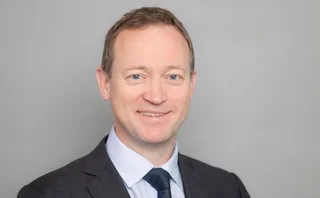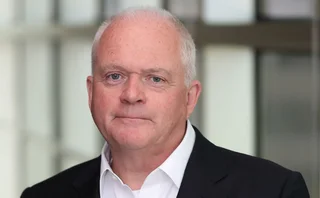
Company profile: Helaba's new reality
Regional state governments no longer pick up the tab in the event of a default, leaving Landesbanks in urgent need of new equity sources. In a move to adapt to this situation, Frankfurt's Helaba Landesbank Hessen-Thüringen is allying itself with structured products and direct retail customers. By Shamillia Sivathambu

Germany's 11 regional state banks – or Landesbanks – are still trying to get rid of the bitter taste left behind on July 18 this year when, after almost a century, they were stripped of their state guarantees. These were privileges that gave them 35% control of Germany's lending market and made them a strong source of public sector underwriting. In the face of such change, Landesbanks are seeking new revenue streams to underpin their vast balance sheets.
Rolf Reichardt, senior vice-president of liquidity management and funding at Helaba Landesbank Hessen-Thüringen (Helaba), says his institution is conscious of the threat it will now face from the private sector. And in order to stay competitive, the bank is making some aggressive changes.
Helaba is realigning its internal business structure to focus on retail structured products, and is just months away from completing the takeover of savings bank Frankfurter Sparkasse, Riechardt says.
"Historically, we didn't need structured products," Reichardt explains. In the past, Helaba's strong institutional focus meant there was little interest in extending products to retail customers via the state's savings banks. Helaba served the wholesale borrowing needs of savings banks. "But the loss of our state guarantees means we need to work closer on the retail side with savings banks," he says.
The bank is now so committed to the retail structured products space that it has already formulated plans to establish an independent advisory team dedicated to savings banks and retail structured products. "Structuring advice will be available on all products, not just those manufactured by Helaba. This is unique in Germany, where providers tend to offer advice pertaining only to their own products," Reichardt says.
The advisory team's explanations will help investors identify those products that carry higher risks, and give Helaba exposure as a trusted, reliable name in the structured products market. Borris Haut, vice-president of liquidity management and funding at Helaba, says: "Structured products remain an interesting proposition in the German market, and we need to develop this... especially with regards to brand loyalty. Currently, loyalty lies with distributors, not products."
Internal reorganisation
In the last four years, structured products accounted for 10% of the bank's assets. "We want this to grow to at least 30% in the next couple of years," Haut explains. To achieve this, Helaba has reorganised its equity derivatives and treasury teams.
In April, the equity derivatives team was integrated into the capital markets division, while the treasury team assumed responsibility for retail equity-linked products. "With Helaba's expertise in interest rate products, the bank thought it would be better to group equity and interest rate-linked products together," Reichardt explains.
In the past, Helaba's equity derivatives team sought the help of an external hedging partner when developing its more complicated structures. "The car industry buys parts from all over the world. It should be the same in our industry," Reichardt says. But while Helaba is not opposed to working with external providers on the more exotic structures, the bank wants to focus on creating a regular stream of in-house products.
In keeping with its level of expertise, Reichardt says Helaba will be committed to developing fund-linked structures rather than warrants or certificates, which are popular in Germany's structured products market. At the moment, Helaba adopts a zero-option structure for its structured products range, but it is considering developing constant proportion portfolio insurance structures, Reichardt adds.
In a move to further strengthen its position as a provider of choice to the retail markets, the bank launched a group charter to bring it increased vertical integration with savings banks at the end of 2003. Helaba, along with its 85% owner, the Giro Association Hesse-Thuringia (SGVHT), which represents the region's 51 municipal authority-owned savings banks, agreed to a common business model with the savings banks in Hesse and Thuringia.
Under the new group charter, known as the S-Group Concept, the separate entities agreed to a common business model based on joint risk management, a joint regional liability fund and joint network accounting. "This has made it the most integrated group among banking groups in Germany… allowing Fitch to give us an A+ group rating, the only regional group within the German savings banks and Landesbank sector to have such a rating," explains Reichardt. As a result, he adds, there is now more intensive co-operation between Helaba and the savings banks.
New acquisition
To further consolidate its presence in the direct retail space, Helaba is in the midst of buying Frankfurter Sparkasse, Germany's sixth-largest savings bank with 89 operating branches and more than 500,000 customers. Reichardt says the acquisition, which is costing E750 million with a further E200 million capital injection, will give Helaba a 50% share of the market in the region and make it one of the leading regional European banks. Although he would not detail the bank's post-takeover plans, he does say it expects synergies in the areas of product development and distribution.
The acquisition of Frankfurter Sparkasse is also expected to enhance Helaba's understanding of the retail market. Prior to its takeover, Frankfurter Sparkasse was a very independent savings bank, Reichardt says. The state of Frankfurt owns a minority stake, while 60% is owned by a group of private individuals, he says. The large private sector influence keeps the bank competitive and market-driven, and this, Reichardt says, will give Helaba a feel for what investors want from the market.
Only users who have a paid subscription or are part of a corporate subscription are able to print or copy content.
To access these options, along with all other subscription benefits, please contact info@risk.net or view our subscription options here: http://subscriptions.risk.net/subscribe
You are currently unable to print this content. Please contact info@risk.net to find out more.
You are currently unable to copy this content. Please contact info@risk.net to find out more.
Copyright Infopro Digital Limited. All rights reserved.
As outlined in our terms and conditions, https://www.infopro-digital.com/terms-and-conditions/subscriptions/ (point 2.4), printing is limited to a single copy.
If you would like to purchase additional rights please email info@risk.net
Copyright Infopro Digital Limited. All rights reserved.
You may share this content using our article tools. As outlined in our terms and conditions, https://www.infopro-digital.com/terms-and-conditions/subscriptions/ (clause 2.4), an Authorised User may only make one copy of the materials for their own personal use. You must also comply with the restrictions in clause 2.5.
If you would like to purchase additional rights please email info@risk.net
More on People
People: JP Morgan’s data and AI move, Eurex clearing chief, and more
Latest job changes across the industry
JP Morgan AI research founder and head departs
Manuela Veloso leaves as bank announces greater spend on tech and AI
SocGen’s head of US Treasury clearing preparations to depart
Bank’s head of product for FX and fixed income prime brokerage for the Americas set to leave later this month
People: You’re fired! US agency rejig, new CROs at ING, StanChart, and more
Latest job changes across the industry
SocGen’s PB clearing head departs for SwapAgent role
Jamie Gavin takes external consulting role for LSEG’s non-cleared swaps platform
Robertson leaves Barclays’ prime services in New York
Head of prime derivatives services unit departs after seven years with the bank for Carbon Point
Citadel Securities hires former Eisler CRO
Pregnell joins market-maker after demise of hedge fund
People: Fishwick hands over BlackRock CRO role, Citi expands Asia FX team, and more
Latest job changes across the industry







